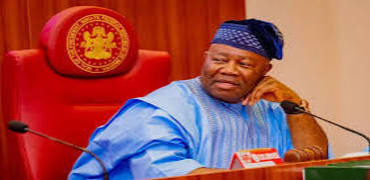A House Divided: The Untold Story Behind Dajoh’s Fall
A House Divided: The Untold Story Behind Dajoh’s Fall
When Aondona Dajoh penned his resignation in a shaky handwritten note, he framed it as an act “in good faith and in the best interest of the state.” But in Makurdi’s political circles, the message was read less as self-sacrifice and more as the inevitable climax of a war that had been simmering long before his gavel first struck the Speaker’s table.
For nearly two years, the Benue State House of Assembly had been more of a battlefield than a legislature. On one side stood Governor Hyacinth Alia, the fiery Catholic priest-turned-politician whose supporters dubbed themselves the masses. On the other stood the formidable Secretary to the Government of the Federation, Senator George Akume, with his bloc of loyalists, self-styled as the stakeholders. Both men claimed to be fighting for the soul of the ruling All Progressives Congress (APC) in Benue. Caught in the middle of this tug-of-war was Dajoh, a soft-spoken lawmaker from Gboko East who quickly became the symbol—and casualty—of the party’s fractured house.
Dajoh’s journey to the speakership was itself a tale of bruising rivalries. In 2023, when the 10th Assembly was proclaimed, Akume threw his weight behind Mrs. Becky Orpin, while Alia leaned heavily on Dajoh, projecting him as the people’s choice. What followed was a dramatic power tussle on the floor of the House, one that split friendships and reshaped alliances. Dajoh’s eventual emergence, backed by Alia, was hailed by his camp as a victory for the governor’s vision of “new politics.” Yet, for the Akume loyalists, it was the beginning of an unresolved vendetta.
From the start, Dajoh’s speakership sat on shifting sand. Each plenary session carried an undertone of mistrust; each decision was scrutinized not on its merit but on which camp it seemed to favor. As the months wore on, Dajoh appeared to wield his authority with a heavy hand, suspending dissenting voices in what critics described as an attempt to silence the SGF’s camp. His most audacious move came just days before his downfall, when he suspended four lawmakers—among them Alfred Berger, the influential Chairman of the House Committee on Information—accusing them of plotting to unseat him. The message was clear: betrayal would be punished. But it also exposed his deepening isolation.
Within 48 hours of that bold strike, the gavel slipped from his hand. His resignation, swift and abrupt, was more than a personal decision; it was the price of navigating a war where loyalty to either faction was never enough. For some insiders, it was less about his missteps and more about the inevitability of being crushed between two immovable forces: a governor determined to consolidate power and a seasoned political warlord unwilling to cede ground.
The House wasted no time in moving forward, suspending its rules in an emergency session and elevating Hyacinth Emberga of Makurdi North to the top seat. The speed of the transition signaled not just urgency, but also a readiness by the factions to reset the chessboard. Emberga’s election was unanimous, but unanimity in Benue politics often masks uneasy compromises.
What remains clear is that Dajoh’s exit has left deep ripples. In local APC chapters, whispers of betrayal mingle with relief, depending on which camp one listens to. Some see him as a martyr of circumstance, a pawn sacrificed in a game too big for him to win. Others regard his resignation as overdue, claiming he mishandled his brief reign by mistaking factional loyalty for institutional strength.
Yet, beyond the politics, his fall underscores a larger truth: the Benue House of Assembly has become a mirror of the APC’s fractured soul. A party at war with itself cannot govern with one voice, and a Speaker without consensus is only a placeholder waiting to be toppled.
As dusk settles over Makurdi, Dajoh’s story reads less like a resignation and more like a cautionary tale. He entered the chamber as a symbol of victory, but left as a reminder that in Benue’s politics, the gavel is never really safe—it is merely borrowed, until the next storm comes.
By Haruna Yakubu Haruna

















